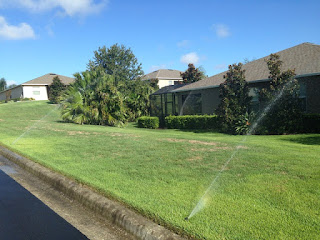By Michael Dukes
“Turf grasses need irrigation systems. Some grasses listed as
Florida-Friendly need tremendous volumes of water. The homeowner also
needs to fertilize and quickly address diseases and pests that will be
present. Despite the homeowner's best efforts, all or part of the turf
will need to be replaced every 4 to 5 years.”
- email from master gardener
A Need Benchmark
People often work
under the assumption that turfgrass needs a lot of water. What is the
definition of a lot? Normally, turfgrass is irrigated far more than it needs to
be and this reinforces the perception that it needs a lot. There are lots of
misconceptions about how much is used and how much is needed. If people knew
how much is really needed, there would be a benchmark and you would have an
idea of where you are relative to what is needed.
 |
| Michael Dukes and Bernard Cardenas in the research plots |
An example is the
comparison homes treatment (no technology, monitor-only) used in our Orange County smart irrigation study. We’re in our 6th year of data collection.
Over that whole time period, the average application for those homes has been
more than an inch per week – that’s over 52 inches a year, no matter how much
rainfall. And we’re getting about 40+ inches of rainfall in a year. That’s 90
inches of water being applied to the landscape. But ET (evapotranspiration) of turfgrass is only
maybe 30 inches in Orlando.
 |
| A properly installed weather-based irrigation controller |
Timing is everything - for turfgrass in particular, with shallow root zones. In theory, if we get 40
inches of rainfall and ET is 30 inches, the amount of rainfall far exceeds the
amount of water that plant needs. But it’s not timed perfectly. There are dry
times and there are times when you get excess water. That’s where irrigation
comes in. If you time that irrigation perfectly you’re in the mid-20 inches of
water needed.
Ideally if you’re
applying at the right time at the right amount, which a smart irrigation controller allows you to do automatically, you should be in that mid-20 inches
of water applied. The comparison home treatments are applying over 50 inches.
That’s why smart technology is a viable way of getting irrigation in the right
ball park. They are not perfect, but when the problem is 2x and you have a
solution that gets you to 1.3x or 1.5x you’ve made a huge dramatic improvement
by doing one thing.
A Use Percentage
I often am asked how
much water is used for irrigation, usually referring to single family homes.
Often we see a mysteriously even number of 50% cited. The truth is that
irrigation water use varies in time and space. In areas with more irrigation
systems, there will necessarily be more irrigation water use. In drier years,
irrigation water use will be higher. I believe the 50% number is a very
convenient number to cite but here’s what we know based on data
from Florida.
The reality is that in a given utility there will be a spectrum of users with most not over irrigating or perhaps irrigating at all. In Mackenzie Boyer’s recent work in Southwest FL we showed this for the Tampa Bay region, (Mining for water: Using billing data to characterize residential irrigation demand). That said, other utilities in the east and southeast part of the state have higher irrigation demand since their conservation programs typically aren’t as developed as in the SW region.
Additional research informing on water-use estimates:
Romero & Dukes (2016): A Method to Estimate Residential Irrigation from Potable Meter Data – Metered data from Orlando (1,781 homes) showed that irrigation accounted for 64% of total use. The first paragraph also gives a good summary of several other studies that reported Florida residential irrigation use (ranging from 25-75% of total use).
Boyer et. al (2014): Irrigation Conservation of Florida-Friendly Landscaping Based on Water Billing Data – Again, the introduction summarizes key statistics from Florida studies. For example, Haley et al. (2007) estimated 64% in central Florida, and Romero and Dukes (2014) estimated 32-63% in central Florida.
A good resource for how much to water your landscape depending on region in Florida, time of year and irrigation system can be found here.
 |
| Image via Ewing |
The reality is that in a given utility there will be a spectrum of users with most not over irrigating or perhaps irrigating at all. In Mackenzie Boyer’s recent work in Southwest FL we showed this for the Tampa Bay region, (Mining for water: Using billing data to characterize residential irrigation demand). That said, other utilities in the east and southeast part of the state have higher irrigation demand since their conservation programs typically aren’t as developed as in the SW region.
Additional research informing on water-use estimates:
Romero & Dukes (2016): A Method to Estimate Residential Irrigation from Potable Meter Data – Metered data from Orlando (1,781 homes) showed that irrigation accounted for 64% of total use. The first paragraph also gives a good summary of several other studies that reported Florida residential irrigation use (ranging from 25-75% of total use).
Boyer et. al (2014): Irrigation Conservation of Florida-Friendly Landscaping Based on Water Billing Data – Again, the introduction summarizes key statistics from Florida studies. For example, Haley et al. (2007) estimated 64% in central Florida, and Romero and Dukes (2014) estimated 32-63% in central Florida.

Hi Michael,
ReplyDeleteYour Quote is very good, I really read many times and bookmark your post. Please keep Posting for Landscape Irrigation
Thank you for sharing this great knowledge.
Have good Day.
irrigation is the best part of farming to conserve 90% of water from watage ,we have to aware farmers to do irrigation in their farmland.
ReplyDeletehere is some best irrigation system ,which teach you how make profit by using irrigation